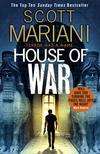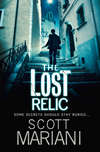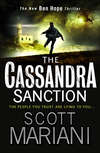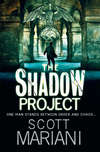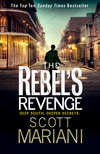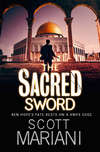Читать книгу: «House of War»
HOUSE OF WAR
Scott Mariani

Copyright
Published by AVON
A division of HarperCollinsPublishers Ltd
1 London Bridge Street
London SE1 9GF
First published in Great Britain by HarperCollins Publishers 2019
Copyright © Scott Mariani 2019
Cover design by Henry Steadman © HarperCollinsPublishers Ltd 2019
Cover photographs: Human-headed winged bulls guarding a door in Dur-Sharrukin © Poulpy; Figure © Henry Steadman
Scott Mariani asserts the moral right to be identified as the author of this work.
A catalogue copy of this book is available from the British Library.
This novel is entirely a work of fiction. The names, characters and incidents portrayed in it are the work of the author’s imagination. Any resemblance to actual persons, living or dead, events or localities is entirely coincidental.
All rights reserved under International and Pan-American Copyright Conventions. By payment of the required fees, you have been granted the non-exclusive, non-transferable right to access and read the text of this e-book on screen. No part of this text may be reproduced, transmitted, down-loaded, decompiled, reverse engineered, or stored in or introduced into any information storage and retrieval system, in any form or by any means, whether electronic or mechanical, now known or hereinafter invented, without the express written permission of HarperCollins.
Source ISBN: 9780008235987
Ebook Edition © October 2019 ISBN: 9780008235994
Version: 2019-09-17
Discover the series you can’t put down …
‘If you like your conspiracies twisty, your action bone-jarring, and your heroes impossibly dashing, then look no farther – the Ben Hope series is exactly what you need’
Mark Dawson
‘Deadly conspiracies, bone-crunching action and a tormented hero with a heart … Scott Mariani packs a real punch’
Andy McDermott
‘James Bond meets Jason Bourne meets The Da Vinci Code’
J. L. Carrell
‘Non-stop action – this book delivers’
Steve Berry
‘Full of authentic detail and heart-stopping action – a real thrill ride’
Ed Macy
‘Scott Mariani is an awesome writer’
Chris Kuzneski
‘Packed with dark intrigue, danger around every corner, bullets flying, sexual tension, and an endless assault of nasty villains … everything a thriller should be and more’
Joe Moore
‘If you’ve got a pulse, you’ll love Scott Mariani; if you haven’t, then maybe you crossed Ben Hope’
Simon Toyne
‘The action comes thick and fast and is choreographed with Mariani’s trademark skill and authenticity. The modern master of mayhem’
Shots Magazine
‘Fans of Dan Brown will love this’
Closer
‘Edge-of-the-seat excitement … I am hooked on this series’
5* Reader Review
‘Gripping adventure, superbly written’
5* Reader Review
‘Cinematic style, fast pace and, above all, fabulous characters’
5* Reader Review
Contents
Cover
Title Page
Copyright
Discover the series you can’t put down …
Prologue
Chapter 1
Chapter 2
Chapter 3
Chapter 4
Chapter 5
Chapter 6
Chapter 7
Chapter 8
Chapter 9
Chapter 10
Chapter 11
Chapter 12
Chapter 13
Chapter 14
Chapter 15
Chapter 16
Chapter 17
Chapter 18
Chapter 19
Chapter 20
Chapter 21
Chapter 22
Chapter 23
Chapter 24
Chapter 25
Chapter 26
Chapter 27
Chapter 28
Chapter 29
Chapter 30
Chapter 31
Chapter 32
Chapter 33
Chapter 34
Chapter 35
Chapter 36
Chapter 37
Chapter 38
Chapter 39
Chapter 40
Chapter 41
Chapter 42
Chapter 43
Chapter 44
Chapter 45
Chapter 46
Chapter 47
Chapter 48
Chapter 49
Chapter 50
Chapter 51
Chapter 52
Chapter 53
Chapter 54
Chapter 55
Chapter 56
Chapter 57
Chapter 58
Chapter 59
Chapter 60
Chapter 61
Chapter 62
Chapter 63
Chapter 64
Chapter 65
Chapter 66
Keep Reading …
About the Author
By the Same Author
About the Publisher
PROLOGUE
Syria, 2015
The two men were the last ones still inside the ancient temple as the invasion force closed in. They had been racing against time in their desperate last-minute bid to rescue as many of the treasures as they could, but they’d been too slow, too late, and their efforts were futile. Nobody was there to help them. Everyone else had fled hours earlier, when the first death knell of artillery fire sounded in the distance and the terrifying rumours became reality. Now the battle was lost and the government forces trying to hold onto the ancient city in the face of withering attack had fallen into full retreat.
These preserved architectural splendours had graced the desert oasis for two thousand years, dating back to when the thriving city had been one of the major centres on the trade route linking the Roman Empire with Persia, India and China. Here the worlds of classical and Eastern culture had melded and blossomed for centuries. Right up until the present day, their noble heritage had remained as a source of beauty and wonder for the thousands of travellers who flocked there each year to marvel.
And now, on this terrible day that would be remembered for a long time, the ancient city was about to fall into the hands of the destroyers.
The two men knew the end was near. Even though their hours of labour had succeeded in moving the majority of the priceless artifacts to a nearby hiding place where they hoped they could survive, there was still so much to do, so many treasures to try to save. It seemed a hopeless task.
‘We must hurry, Julien,’ said Salim Youssef to his younger associate. ‘They’ll be here any minute.’ He was trying to lift a magnificent Greco-Roman bust from its plinth to place it on a trolley and wheel it outside to the already overloaded truck. But the artifact was far too heavy for his seventy-four-year-old arms to handle. He gasped and wheezed, but he wouldn’t give up. For the last forty years the Syrian had been devotedly in charge of the preservation and cataloguing of the priceless antiquities in this place, which for him was as sacred and holy as a site of religious worship.
His companion was a Frenchman named Julien Segal, twenty-five years his junior, who had been closely involved in Salim’s work for over a decade. He was based equally in Paris and the Middle East, and spoke Arabic fluently. A man known for his elegant dress style and cosmopolitan chic, he wasn’t looking his stylish best at this moment, as he struggled and sweated to drag a six-foot Akkadian alabaster statue across the flagstone floor towards the archway near to which the truck was parked. Even inside the relative coolness of the temple, the August desert heat felt as though it could bake a man inside his skin.
‘It’s no use, Salim. We’ll never make it. Everyone else has run for it, and we should do the same while we still can.’
‘You go, Julien,’ Salim wheezed, clutching his chest. ‘I’m staying. I won’t abandon these treasures, no matter what. This place is all I know and care about.’
‘But they’ll kill you, Salim.’
‘Let those lunatic butchers do their worst,’ the old man said. ‘I’m not afraid of them. I have lived my life and don’t have many years left. But yours is still ahead of you. Go! Save yourself!’ He pulled the truck keys from his pocket and tossed them to Julien Segal.
The Frenchman was about to reply, ‘I won’t leave without you.’ But the words died in his mouth as he turned to see the sight that froze his blood.
They were here.
Nine men had come into the temple’s main entrance and now stood in a semicircle, watching them with detached curiosity. All were bearded and clad in dusty battledress, armed with automatic weapons. Their leader stood in the middle, with four of his soldiers each side of him. He wore black, in accordance with his rank as an ISIL commander. A holstered pistol and a long, sheathed knife hung from his belt.
That was when Julien Segal saw that three of the men were also clutching heavy iron sledgehammers in addition to their weaponry. He opened his mouth to speak, but his throat had gone dry.
Salim spoke for him. The old man stepped away from the bust he’d been trying to manhandle, and advanced towards the invaders, fists clenched in anger. ‘You are not welcome here! Leave now!’
The commander in black stepped forward to meet him. He gazed around the temple’s interior, looking at the statues and other artifacts that Salim and his colleague hadn’t yet been able to remove to safety, and the vacant plinths of those that they had. His voice echoed in the stone chamber as he spoke:
‘I am Nazim al-Kassar. You must be Salim Youssef, the curator. Tell me, old man. This place is looking quite empty. Where have you hidden the rest of these idolatrous pieces of trash you call art?’
‘So you have come here to destroy them,’ Salim said defiantly.
‘This house of blasphemy, along with everything inside it and all that you have vainly tried to rescue,’ said Nazim al-Kassar. ‘It shall be razed to the ground, inshallah.’
‘You will not! You must not!’
The commander smiled. ‘These are the idols of previous centuries, which were worshipped instead of Allah. They have no place in the new Caliphate that will now rule this country for the rest of time. Allah commands that they be shattered and broken into dust.’
‘Savages! Vandals! What gives you the right to erase history? You think you’re doing Allah’s bidding? Where does the Qur’an make such a command? Nowhere! I am also a Muslim, and I say that you bring shame and disgrace upon our religion!’ The old man was seething with fury. Cringing behind him, Julien Segal was too terrified to utter a word.
The commander’s voice remained calm as he pointed a black-gloved finger at Salim and replied, ‘Old man, I will ask only once. You will lead me to where you have hidden the idols of this false divinity, so that the soldiers of the Caliphate may consign them to the past, where they belong.’
‘Then I belong there with them,’ Salim said. ‘I will die before I allow you to wreak your unholy destruction in this place.’
‘So be it,’ the commander said. ‘What you ask for, you will receive.’ He nodded to his men. Four of them stepped forwards, seized Salim and Julien Segal each by the arms, and forced them down to their knees on the flagstone floor. The Frenchman knelt with his head bowed and shoulders sagging. Next to him, the older man refused to break eye contact with his tormentors and remained straight-backed, chin high.
The commander reached down to the hilt of the long, curved knife that hung from his belt, and drew out the blade with a sigh of steel against leather. Salim wouldn’t take his eyes off him for an instant, even though he knew what was coming.
Julien Segal let out a whimper. ‘For God’s sake, Salim. We have to tell them. Please.’
‘I’m sorry, Julien. I will not go to my grave knowing that I betrayed my life’s work to these maniacs.’
The commander stepped around behind Salim.
Salim closed his eyes.
What happened next had Julien Segal burying his face in the dirt and crying in unbearable anguish. But the old man never made a sound. He faced his death with the same steely resolve that he’d shown throughout his life.
Moments later, Julien Segal felt the thump of something hitting the floor beside him. Followed by a second, heavier thud as Salim’s decapitated body slumped forward to fall on the floor next to where the commander had tossed his severed head. Segal couldn’t bring himself to look directly at it, and instead watched in horror as the blood pool spread over the floor, trickling into the cracks between the flagstones and reflecting the light from the arched window.
‘Now it’s your turn,’ said the man called Nazim al-Kassar.
Chapter 1
The present day
It was a cold, bright and sunny October morning in Paris, and Ben Hope was making a brief stop-off in the city on his return from a long journey. The trip to India hadn’t been a scheduled event, but then few things in his life were, or ever had been, despite his best efforts to lead the kind of peaceful and stable existence he might have wished for. It seemed that fate always had other plans for him.
All he really wanted to do now was put the experience behind him, move on from it and get home. Home being a sleepy corner of rural Normandy some three hundred kilometres west of Paris, a place called Le Val, and he couldn’t wait to get there. First he had some business to attend to in the city, which he intended to get sorted as quickly as possible, partly since it was a rather dull chore that he’d put off for too long.
The first thing he’d done when his plane had landed at Orly Airport the previous evening was to call Jeff Dekker, his business partner at Le Val, to say he was back in the country and would be home by early next afternoon. Jeff was pretty well used to Ben’s frequent impromptu disappearances; all he said was ‘See you later.’
Ben’s second action was to call a Parisian estate agent he knew to talk about finally selling the backstreet apartment he’d owned for years and never used any more. Back when he’d worked freelance and lived a nomadic existence, the place had come in handy as an occasional base camp in the city. It had never been more than a bolthole for him, and he’d made little effort to furnish or decorate it beyond the absolute basics of necessity. The pragmatic nature of military life was an ingrained habit that refused to die in him, though he’d been out of that world for quite some years.
Whatever the case, the apartment had long since become surplus to his requirements. Though every time he’d been on the verge of putting the place up for sale, as had happened on several occasions, another of those bolts from the blue would arrive to yank him off on some new crazy mission or other. Which, as he was all too aware, was just a reflection of the broader reality that whatever kinds of plans he had in mind, some new crisis would invariably loom up to divert him right off track.
Such was life. Maybe, after another forty years, he’d get used to it.
But that wasn’t going to happen this time, he told himself. This time he was going to bite the bullet, put the place on the market, go home to Le Val and get back down to running his business. The eternally patient Jeff, his longtime friend and co-director of the tactical training centre they’d founded and built together, might appreciate Ben’s actually being around sometimes. Instructing the world’s top law enforcement, security and close protection services in the finer points of their craft was a dirty job, but someone had to do it.
It was just after eight a.m. At ten-thirty he was due to meet with the property agent, a nervous-mannered chap called Gerbier who, Ben already knew, would spend an hour hemming and hawing about the difficulties of selling the place. First, because despite its theoretically desirable central location it was all but totally secreted away among a cluster of crumbly old buildings and its only access was via an underground car park. Second, because even at its best it had never looked like much on the inside, either, and needed decoration work to appeal to any but the most Spartan of buyers. And third, because right now wasn’t a good time for the Parisian property market in general.
Ben had to admit the guy might have a point about that. For months the city had been locked in increasingly turbulent civil unrest, boiling with constant anti-government protests that had sparked off over a long list of political and social grievances and seemed to grow more serious and violent each passing day. There had been mass arrests, the cops had started deploying armoured personnel carriers and water cannon in the streets, and there were no signs of things cooling down any time soon. Now the troubles had spread across the city into Ben’s normally quiet neighbourhood. He had lain awake for some time last night, listening to the screeching sirens and loud explosions of the latest pitched battle between rioters and the police. It had sounded like both sides meant business.
‘Who can tell where this will end?’ Gerbier had fretted over the phone. ‘The city’s falling into anarchy. Nobody’s buying any more.’
How justified was Gerbier’s pessimism, only time would tell. Ben had been up with the dawn that morning, as always. He’d laboured through his usual gruelling pre-breakfast workout of press-ups, sit-ups and pull-ups, taken a one-minute tepid shower, pulled on fresh black jeans and a denim shirt, scanned a few latest news headlines online, meditatively smoked a couple of Gauloise cigarettes while gazing out at the non-existent view for what might be one of the last times if he got lucky finding a buyer soon, then turned his thoughts to eating breakfast. Dinner last night had been a sandwich wolfed down on the hoof at the airport, and he was starving.
That was when Ben had realised that there wasn’t a scrap of food in the apartment. Worse, much worse, the bare kitchenette cupboards contained not a single coffee bean.
And so here he was, heading briskly along the street, his scuffed brown leather jacket zipped against the chill and the third Gauloise of the day dangling from his lip, in the direction of a local coffee bar where he could get some breakfast and a much-needed fix of the black stuff. It was a five-minute stroll, but when he got there he discovered to his chagrin that the coffee bar had had its windows smashed in last night’s disturbances and was shut.
The owners weren’t the only local traders to have suffered damage from the latest round of protests. All up and down the street, storekeepers were resignedly sweeping up broken glass, nailing plywood sheets over their shattered windows, hauling out buckets of hot soapy water to try and scrub away graffiti that had appeared overnight. Ben stopped for a brief conversation with Habib, who ran the little Moroccan grocery store and tobacconist’s where he’d often bought his cigarettes. Habib expressed sympathy with the protesters but worried that his insurance premiums would sky-rocket if these riots kept up. Ben offered his commiserations, wished Habib good luck and walked on in search of breakfast. He still had plenty of time to kill before meeting Gerbier.
The signs of last night’s troubles were all around. Though it hadn’t rained overnight the roads and pavements were slicked wet, small rivers created by police water cannon trickling in the gutters and pooling around washed-up garbage that choked the drain grids. A recovery crew with a flatbed lorry were removing the burnt-out shells of three cars that had been torched by the protesters. Barriers and cones had reduced the traffic to a crawl as cars and vans and motorcycles threaded their way along streets still littered with riot debris and spent tear gas canisters.
As Ben walked along, he spied one rolling in the gutter and picked it up to examine it, just out of curiosity. It was the strong stuff, the real McCoy. Then again, France’s riot police never had mucked about when it came to dispersing violent demonstrations. The warning on the empty canister said, in French: DANGER – DO NOT FIRE DIRECTLY AT PERSON(S) AS SEVERE INJURY OR DEATH MAY RESULT. Ben had seen from the online news headlines that a couple of civilians had already been accidentally killed that way as the protests mounted. There was a good chance of more fatalities to come. One serious casualty among the police, and the government would probably send in the army.
Ben continued on his way, thinking about Gerbier’s words and wondering where, indeed, it was all going to end. As he’d grown older and wiser he had come to understand that history was the key to predicting what lay in the future. As the saying went, those who failed to learn from the hard lessons of the past were doomed to repeat them. Paris had seen more than its fair share of revolutionary unrest in its time, and none of it seemed to have done much good. The big one of 1789 had kicked off much the same way as was happening now – and look how that ended, eating itself in an orgy of blood and severed heads and giving rise to the Napoleonic empire and rather a lot of even bloodier wars, followed eventually by a new monarchy to take the place of the old. Then had come the July Revolution of 1830, the one portrayed in the famous Delacroix painting that used to be on the old 100-franc banknote, depicting the topless Liberty wielding tricolour flag and musket as she led the people to victory, this time against the royal regime of Charles X. Same dubious result. Then just eighteen years later they’d been at it again, with the populist uprising of 1848 that had spilled enough blood in the streets of Paris to tear down the establishment once more and trigger the foundation of the Second Republic, which lasted exactly three years before the Second Empire turned the country back into a de facto monarchy.
And on, and on, through the ages and right up to the present. Round and round we go, Ben thought. An endless cycle of inflamed passion leading to disappointment, and resentment, and blame, simmering away and slowly building up to the next outburst. And for what? So much suffering and destruction could only deepen the rift between nation and state, while calls for reform would largely go unheeded and life would ultimately carry on just like before. Sure, go ahead and protest about overinflated taxes and rising costs of living and the insidious encroachment of the European superstate and police brutality and human rights infringements and loss of personal freedoms and privacy and anything else you feel strongly about. All fine. Angry mobs ripping their own beautiful city apart, looting and pillaging, harming small businesses, traumatising innocent citizens, not so fine. Unless you really believed that a violent street revolution was the only possible way to change things for the better.
Well, good luck with that.
Those were all the things on Ben’s mind as he walked quickly around the corner of Rue Georges Brassens and collided with a young woman who, quite literally, ran into him without looking where she was going.
He didn’t know it yet, but fate had just launched another of those bolts from the blue at him.

